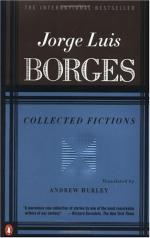
|
| Name: _________________________ | Period: ___________________ |
This test consists of 15 multiple choice questions and 5 short answer questions.
Multiple Choice Questions
1. In "Undr," though the people are barbarous, they claim to be what?
(a) Devout Muslims.
(b) Virtuous pagans.
(c) Ascetics.
(d) Christian.
2. In "The Duel," though friends, Clara and Marta compete at what activity?
(a) Making themselves beautiful.
(b) Painting.
(c) Memorizing poetry.
(d) Playing the piano.
3. In "Undr," what does Ulf do to avoid execution?
(a) Becomes the king's court jester.
(b) Compses a poem in praise of the king.
(c) Volunteers to join the army.
(d) Creates a map of some unknown territory.
4. In "The Night of the Gits," who is The Captive?
(a) A man entranced by literature.
(b) A prostitute.
(c) A war prisoner.
(d) An innocent boy.
5. In "The Bribe," what does Professor Einarrson write?
(a) A lone volume of an encyclopedia.
(b) A fawning tribute to Dr. Winthrop.
(c) An analysis of Wordsworth.
(d) A letter that is in direct opposition to Dr. Winthrop's views.
6. In "The Congress," why does the Congress fall apart?
(a) It is disbanded by some Socialists.
(b) All its members mysteriously fall ill.
(c) Internal political battles ruin it.
(d) Its founder goes bankrupt.
7. In "August 25, 1983," what hotel room does Borges go to?
(a) 19.
(b) 63.
(c) The room is numberless.
(d) 49.
8. In "The Bribe," what does Dr. Winthrop have to do?
(a) Prove Shakespeare was not the sole author of his plays.
(b) Publish an article on Keats.
(c) Decide who will chair an academic conference.
(d) Kidnap Herbert Locke.
9. In "A Prayer," what is the narrator's attitude toward his prayer?
(a) He doesn't think much about it: he says the words with no thought.
(b) He repudiates it.
(c) He hopes it will give him worldly riches.
(d) He thinks it will make sure he is saved.
10. In "Everything and Nothing," which of the following best describes Shakespeare?
(a) He is jealous of Ben Jonson.
(b) He believes he should have spent more time with his wife, and less time writing plays.
(c) His many imitators infuriate him.
(d) He has no personal identity other than that of the characters he creates.
11. In "The Other," who does a 70-year-old Borges converse with?
(a) Virgil.
(b) His immortal soul.
(c) Edgar Allan Poe.
(d) An 18year-old version of himself.
12. In "Blue Tigers," what are the Blue Tigers?
(a) Mysterious stones.
(b) Members of a religious sect.
(c) Arguments that employ specious reasoning.
(d) Mythological tigers made of ice.
13. In "Pedro Salvadores," Pedro belongs to which party?
(a) The Aristotlean Thinkers.
(b) The Nazi party.
(c) The Unitarian party.
(d) The Whigs.
14. What is the event in "The Elderly Lady"?
(a) Her 100th birthday.
(b) Her 90th birthday.
(c) The Day of the Dead.
(d) Christmas.
15. In "The Disk," what god is associated with the disk?
(a) Thor.
(b) Vishnu.
(c) Odin.
(d) Isis.
Short Answer Questions
1. In "The Ethnographer," what does Fred Murdock do with the secret he learns from the Indians?
2. In "Avelino Arredondo," whom does Avelino murder?
3. Which of the following best describes the theme of "Mutations"?
4. In "Dreamtigers," the protagonist can see only little tigers, what kind does he want to see?
5. In "The Maker," what physical problem is the protagonist going through?
|
This section contains 578 words (approx. 2 pages at 300 words per page) |

|




